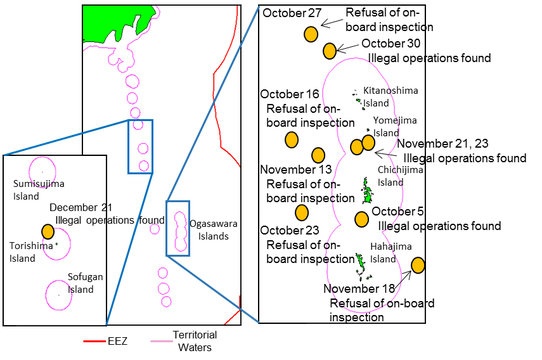Japan-China Relations
The Issue of Chinese Coral Vessels in the Seas Close to Japan, Including Around the Ogasawara Islands
January 20, 2015
1. Current Situation
Since mid-September 2014, multiple vessels believed to be Chinese coral vessels have been found in the waters near the Ogasawara Islands. In light of the situation, the relevant ministries and agencies of Japan have stepped up their measures and the Government of Japan has made representations through diplomatic channels including Japan-China Foreign Ministers' Meeting.
Note: As from Oct 30th, the number of vessels includes those found in the seas around both Ogasawara and Izu islands as well as in the waters stretching between those two groups of islands.
The Number of Chinese Coral vessels around Ogasawara Islands
(released by the Japan Coast Guard)
| September 15th | 17vessels |
| 23rd | 25vessels |
| October 1st | 42vessels |
| 13th | 46vessels |
| 14th | 31vessels |
| 20th | 24vessels |
| 21st | 51vessels |
| 23rd | 113vessels |
| 26th | 102vessels |
| 30th | 212vessels |
| November 3rd | 205vessels |
| 7th | 191vessels |
| 8th | 192vessels |
| 10th | 141vessels |
| 12th | 117vessels |
| 13rd | 145vessels |
| 14th | 116vessels |
| 15th | 57vessels |
| 16th | 58vessels |
| 17th | 70vessels |
| 19th | 44vessels |
| 20th | 47vessels |
| 22nd | 33vessels |
| 24th | 8vessels |
| 26th | 4vessels |
| 27th | 0vessels |
| 28th | 0vessels |
| 29th | 3vessels |
| December 1st | 1vessel |
| 2nd to 5th | 0vessels |
| 7th | 1vessel |
| 11th to 16th | 0vessels |
| 17th | 1vessel |
| 18th | 1vessel |
| 19th | 3vessels |
| 21st | 2vessels |
| 23rd | 0vessels |
| 25th | 3vessels |
| 30th | 0vessels |
| 31st | 0vessels |
| January 2nd | 0vessels |
| 3rd | 0vessels |
| 17th | 2vessels |
| 19th | 1vessel |
| 22nd | 2vessels |
Note: As from Oct 30th, the number of vessels includes those found in the seas around both Ogasawara and Izu islands as well as in the waters stretching between those two groups of islands.
2. Japan’s Responses
 Provided by the Japan Coast Guard
Provided by the Japan Coast Guard
(1) Enhancement of controls
- The relevant ministries and agencies, including the Fisheries Agency and the Japan Coast Guard(JCG), are working together to increase their crackdowns on foreign fishing vessels.
- Since October 5, 2014, the JCG has arrested ten Chinese captains in Japan's territorial waters and exclusive economic zone.
(2) Higher penalties against illegal operations and other activities
On November 19, the Diet revised relevant legislation for significantly raising the maximum fines for illegal operations of foreign fishing vessels. The revision is aimed at maximizing its deterrent effect on poaching by foreign fishing vessels in Japanese seas.
Revisions
- Fine for operations in Japan's territorial waters and unauthorized operations in Japan's exclusive economic zone: 30 million yen (Under existing legislation: Operations in Japan's territorial waters: 4 million yen; Unauthorized operations in Japan's exclusive economic zone: 10 million yen)
- Fine for evading on-board inspection: 3 million yen (Under existing legislation: 300,000 yen)
The cash collateral is also set to increase significantly.
Revisions
- Unauthorized operations and operations in prohibited sea areas: 30 million yen
- Evading on-board inspection: 3 million yen
- Additional fine for illegally harvested coral: 6 million yen/kg
(3) Requests through diplomatic channels
Through diplomatic channels, the Government of Japan has repeatedly expressed regret to China, along with requesting the prevention of recurrences.
In addition, the following discussion took place at the Japan-China Foreign Ministers' Meeting on November 8.
- Minister for Foreign Affairs Fumio Kishida said that the illegal operation of large numbers of Chinese coral vessels in the seas close to Japan, including around the Ogasawara Islands, is extremely regrettable. He stated that, while he is aware that the Chinese side is also in the process of responding earnestly, it will be important to enhance the effectiveness of controls in China, and that he wants to strengthen cooperation between the relevant authorities.
- Minister of Foreign Affairs Wang Yi said that the Chinese side is also taking the necessary measures.

